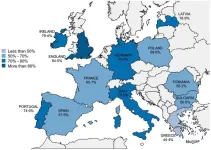(Press-News.org) Seven out of ten homes in Europe are smoke-free, according to a major survey published today (Thursday) in ERJ Open Research [1]. However, some countries have come further than others in protecting children and adults from second-hand tobacco smoke in the home.
Greece came out bottom of the 12 countries in the survey, with smoking allowed in more than half of homes. In Romania, Bulgaria and Spain more than four in ten homes allow smoking to take place. England scored the highest out of the 12, with more than eight in ten homes smoke-free, with Ireland, Latvia and Italy following next.
The researchers say that the proportion of smoke-free homes is growing but progress is too slow, and more work is needed to protect children and adults from the health effects of breathing second-hand smoke in the home.
The study's author is Olena Tigova from the Tobacco Control Unit of the Catalan Institute of Oncology, Barcelona, Spain. She said: “Exposure to second-hand tobacco smoke, in any setting, is harmful to both adults and children. Since 2004, many European countries have introduced smoke-free regulations in public places. However, private settings, particularly homes, remain common sites for smoking and tobacco-smoke exposure. With this research, we wanted to examine the home smoking rules across the general population in Europe. Although some national surveys have taken place, there has been no multi-country survey in Europe since 2010.”
Around 1,000 people were surveyed in each of the 12 countries taking part in the research (11,734 people in total). These people were carefully selected to represent the population of each country and were interviewed face-to-face in 2017-18. They were asked whether smoking was allowed anywhere inside their homes and, if so, whether there were any restrictions on smoking indoors.
The survey showed that around 70% of all people interviewed do not allow smoking anywhere in their homes. A further 18% said they have some rules but are not completely smoke-free. Surprisingly, about 13% of homes where there are no smokers living in the house, still allow visitors to smoke.
The proportion of smoke-free homes according to country from highest to lowest was:
England 84.5%
Ireland 79.4%
Latvia 78.9%
Italy 75.8%
Germany 75.0%
Portugal 74.0%
Poland 69.6%
France 65.1%
Spain 57.6%
Bulgaria 56.6%
Romania 55.2%
Greece 44.4%
“Countries in Northern Europe have more smoke-free homes, while Eastern Europe and less affluent countries have more homes with partial smoking rules, allowing smoking in specific areas or on certain occasions,” Olena Tigova said.
The researchers also looked at other factors that seem to influence rules on smoking in the home. They found that women, older people, people with a higher level of education and those living with children are more likely to have smoke-free homes.
Tigova added: “Our findings suggest that smoke-free homes are gradually increasing in Europe by about 1% each year. However, at this slow rate, it could take another 30 years for all homes in Europe to be smoke-free. To speed things up, stronger tobacco control measures are essential. Expanding smoke-free laws in workplaces, public spaces, and some private areas like cars, combined with new strategies to reduce smoking at home, will help make more European homes smoke-free sooner.”
The researchers plan to broaden their study to examine levels of vaping in European homes and exposure to second-hand smoke and vape fumes in cars. They are also studying how best to encourage people to make their homes smoke-free.
Dr Filippos Filippidis is Chair of the European Respiratory Society Tobacco Control Committee, a reader in public health at Imperial College London, UK, and was not involved in the research. He said: “While it’s good to see that more homes are becoming smoke-free, this survey reveals that there are countries that are lagging far behind, and that progress is too slow.
“Across Europe, millions of people still smoke and millions more are exposed to second-hand smoke. Making our homes smoke-free protects children and adults from second-hand smoke and it can help smokers to cut down or quit too.
“The cost of smoking in Europe, both to the public purse and to public health, it too high. We need comprehensive smoke-free laws and freely available support to help people quit.”
END
Survey of 12 European countries reveals the best and worst for smoke-free homes
2024-11-28
ELSE PRESS RELEASES FROM THIS DATE:
First new treatment for asthma attacks in 50 years
2024-11-28
An injection given during some asthma and COPD attacks is more effective than the current treatment of steroid tablets, reducing the need for further treatment by 30%.
The findings, published today in The Lancet Respiratory Medicine, could be “game-changing” for millions of people with asthma and COPD around the world, scientists say.
Asthma attacks and COPD flare-ups (also called exacerbations) can be deadly. Every day in the UK four people with asthma and 85 people with COPD will tragically die. Both conditions are also very common, in the UK someone has an asthma attack every ...
Certain HRT tablets linked to increased heart disease and blood clot risk
2024-11-28
Certain hormone replacement therapy (HRT) tablets containing both oestrogen and progestogen are associated with a higher risk of heart disease and rare but serious blood clots known as venous thromboembolism (VTE) in women around the age of menopause, finds a study from Sweden published by The BMJ today.
Another HRT tablet called tibolone was associated with an increased risk of heart disease, heart attack and stroke, but not blood clots, “highlighting the diverse effects of different hormone combinations and administration methods on the risk of cardiovascular disease,” say the researchers.
HRT is used to relieve menopausal ...
Talking therapy and rehabilitation probably improve long covid symptoms, but effects modest
2024-11-28
Cognitive behavioural therapy (CBT) and a programme of physical and mental rehabilitation probably improve symptoms of long covid, but the effects are modest, finds a review of the latest evidence published by The BMJ today.
Intermittent aerobic exercise also probably improves physical function compared with continuous aerobic exercise. But the researchers found no compelling evidence to support the effectiveness of other interventions, including certain drugs, dietary supplements, inspiratory muscle training, transcranial ...
Ban medical research with links to the fossil fuel industry, say experts
2024-11-28
An investigation published by The BMJ today reveals the extent of fossil fuel industry involvement in medical research, leading to fresh calls for academics and publishing companies to cut ties with companies.
An analysis by journalists Hristio Boytchev, Natalie Widmann and Simon Wörpel found that over the past six years, more than 180 medical articles have acknowledged fossil fuel industry funding, and an additional 1000 articles feature authors who worked for a fossil fuel company or related organisation.
While many studies don’t have an obvious link with fossil fuel industry interests, experts told The BMJ that publishing research ...
Different menopausal hormone treatments pose different risks
2024-11-28
Researchers at Uppsala University have analysed the effects of seven different hormone treatments for menopausal symptoms on the risk of blood clots, stroke and heart attack. The study, which involved around one million women aged between 50 and 58, shows that the risks differ depending on the active substance and how the medicine is taken. Published in the scientific journal BMJ, this is the largest and most comprehensive study of currently prescribed hormonal substances in the world.
“There is concern among women that menopausal hormone therapy increases the risk of cardiovascular disease. This concern is based on older studies conducted more than ...
Novel CAR T cell therapy obe-cel demonstrates high response rates in adult patients with advanced B-cell ALL
2024-11-27
Patients with relapsed or refractory CD19-positive B-cell acute lymphoblastic leukemia (ALL) who were treated with the novel anti-CD19 chimeric antigen receptor (CAR) T cell therapy, obecabtagene autoleucel (obe-cel), experienced high response rates and most did not need a subsequent stem cell transplant (SCT), according to results from the Phase Ib/II FELIX trial co-led by researchers at The University of Texas MD Anderson Cancer Center.
The findings, published today in the New England Journal of Medicine, ...
Clinical trial at Emory University reveals twice-yearly injection to be 96% effective in HIV prevention
2024-11-27
For oral medications that prevent new HIV infection to be effective, the patient must take certain actions, including attending doctor’s visits every three months and – most importantly – consistency.
These daily oral antiretrovirals, more commonly referred to as PrEP (pre-exposure prophylaxis), such as Truvada®, are extremely effective at HIV prevention, but only if they are taken daily as directed. Truvada’s efficacy is greatly compromised when taken inconsistently.
However, results from a recent Gilead-funded clinical trial (Purpose-2) led by physicians at Emory University ...
Discovering the traits of extinct birds
2024-11-27
Looking to inform the conservation of critically endangered bird species, University of Utah biologists completed an analysis identifying traits that correlate with all 216 bird extinctions since 1500.
Species most likely to go extinct sooner were endemic to islands, lacked the ability to fly, had larger bodies and sharply angled wings, and occupied ecologically specific niches, according to research published this month.
While some of these findings mirror previous research on extinct birds, they are the first to correlate bird traits with the timing of ...
Are health care disparities tied to worse outcomes for kids with MS?
2024-11-27
MINNEAPOLIS – People who develop multiple sclerosis (MS) as children and grow up in less advantaged neighborhoods may have a larger volume of inflammation and brain tissue loss on imaging than those who grow up in more advantaged neighborhoods, according to a study published in the November 27, 2024, online issue of Neurology®, the medical journal of the American Academy of Neurology.
MS rarely develops in children. About 5% of people with MS are diagnosed before age 18.
In addition to neighborhood location, worse brain imaging outcomes were also seen ...
For those with CTE, family history of mental illness tied to aggression in middle age
2024-11-27
EMBARGOED FOR RELEASE UNTIL 4 P.M. ET, WEDNESDAY, NOVEMBER 27, 2024
MINNEAPOLIS – People who have chronic traumatic encephalopathy (CTE) who have a family history of mental illness may have a higher risk of aggression in middle age, according to a study published in the November 27, 2024, online issue of Neurology®, the medical journal of the American Academy of Neurology.
CTE is a neurodegenerative disease associated with repeated head injuries, often seen in athletes and military personnel, that can lead to mood changes and dementia.
“This ...





